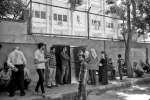- Text size
 |
|  |
|  |
| 
- Français
UNHCR warns of increased risk of mass displacement in Libya
Briefing Notes, 18 March 2011
This is a summary of what was said by UNHCR spokesperson Melissa Fleming – to whom quoted text may be attributed – at the press briefing, on 18 March 2011, at the Palais des Nations in Geneva.
UNHCR and partners have done extensive contingency planning and are ready to work with the Egyptian Government to prepare for a massive influx of people fleeing the violence in Libya. It is also possible that the current conflict could cut off access to safe places and passage out of the country. The events in the coming days will be critical in determining whether mass displacement from the eastern part of Libya takes place.
We have seen an increase in the number of Libyans fleeing into Egypt in the past few days, with around 1,490 arriving on Wednesday, out of a total of 3,163 people. The majority of those interviewed at the Egypt border said that they left because of fear of being caught up in fighting. Many mentioned the threats made by the Government in recent days to bombard Benghazi.
A Libyan family from Ajdabiyya that crossed into Egypt yesterday told UNHCR that radio broadcasts are telling the population that they should leave or risk being caught up in combat. They also said that planes were dropping pamphlets encouraging civilians to leave.
A Reuters team that left Ajdabiyya on Wednesday told UNHCR that they narrowly escaped as the city fell to pro-Government troops." They came from everywhere in massive force and the rebels were no match. People ran for their lives", one of the journalists said. The team say they escaped by "pure luck" while four New York Times journalists were captured.
One Palestinian crew member of the same Reuters crew has been denied entry into Egypt. He is with a 64 year old Palestinian man and his daughter who have been waiting since Tuesday. Other Palestinian families have been turned back and are waiting inside Libya.
Our team met two men who arrived with gunshot wounds. One of them, who claimed to be a revolutionary shot in the fighting in Raz Lanuf last week, said there was no more room in the Benghazi hospital, forcing him to come to Egypt for treatment.
Some of those interviewed were non-committal about the reasons for their departure, saying that they had simply come to seek medical attention. Yet the packed cars, piled high with luggage, suggested otherwise. Others were more frank in their assessment. One man told us," We wanted democracy but now we got war."
Meanwhile, on the Tunisian border with Libya, distant sounds of gunfire were heard from deep inside Libya.
A steady flow of some 1,000 new arrivals continued to cross into Tunisia, the majority originating from sub-Saharan Africa.
UNHCR heard consistent accounts from new arrivals of all nationalities about numerous checkpoints along the route from Tripoli to the Rad Adjir border with Tunisia. They described harassment on the route from pro-Government soldiers, including the continued confiscation of mobile phones, memory cards and cameras.
Refugees and asylum-seekers who are in touch with UNHCR via our hotline in Tripoli and Geneva have reported that fleeing to the border has become much more perilous, particularly for single men, who risk being forcibly recruited into the army. The family of an Ethiopian man in Tripoli claims that he narrowly escaped forced recruitment when pro-Government forces came to the abandoned aircraft hangar in a suburb of Tripoli where he and around 1,500 people, including Sudanese and Chadians, have taken refuge.
In Tunisia new arrivals who have been supported by their embassies to travel to the border report less stressful journeys than those that have made the journey alone or unsupported. Eritrean refugees said that they fled persecution in Eritrea, so could not call upon their embassy for support. One Eritrean refugee described a 'calculated risk' in making a run for the border, but said it would be "better to die in transit than die hiding in Libya."
Hundreds of refugees remain in hiding in Libya, with many reporting to UNHCR that they are running out of food and living in a constant state of fear. UNHCR national staff in Tripoli and a number of partners continue to offer assistance to the refugees and asylum-seekers they are in touch with.
As of 16 March a total of 300,706 persons have fled Libya to neighbouring countries. This includes 158,721 to Tunisia (including 19,022 Tunisian, 16,149 Libyans (partly normal cross border movement) and 123,550 others), 128,814 to Egypt (total including 72,302 Egyptians and 56,512 others), 4,077 to Niger (including 3,575 from Niger and 502 others) and Algeria (a total 9,094, including those that were evacuated by air, land and sea).
UNHCR Hotline numbers:
In Libya
Land line:+218-21-4777503 (24 hours)
Mobile:+218-92-552-3671 (9:00 to 14:00 hours)
Mobile:+218-91-444-31-94
Mobile:+218-92-686-23-38
In Geneva
+41 22 739 8855
+41 22 739 8465
+41 22 739 7484
+41 22 739 8542



















































